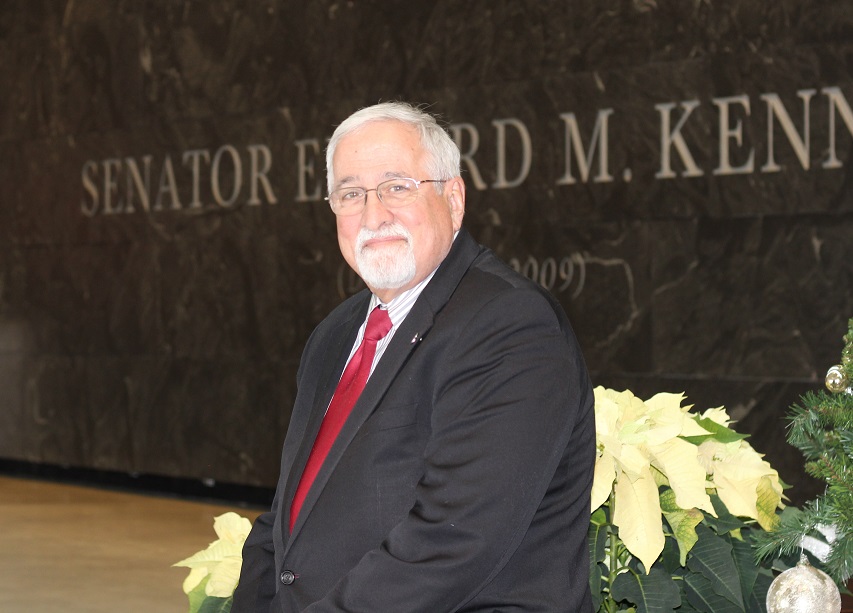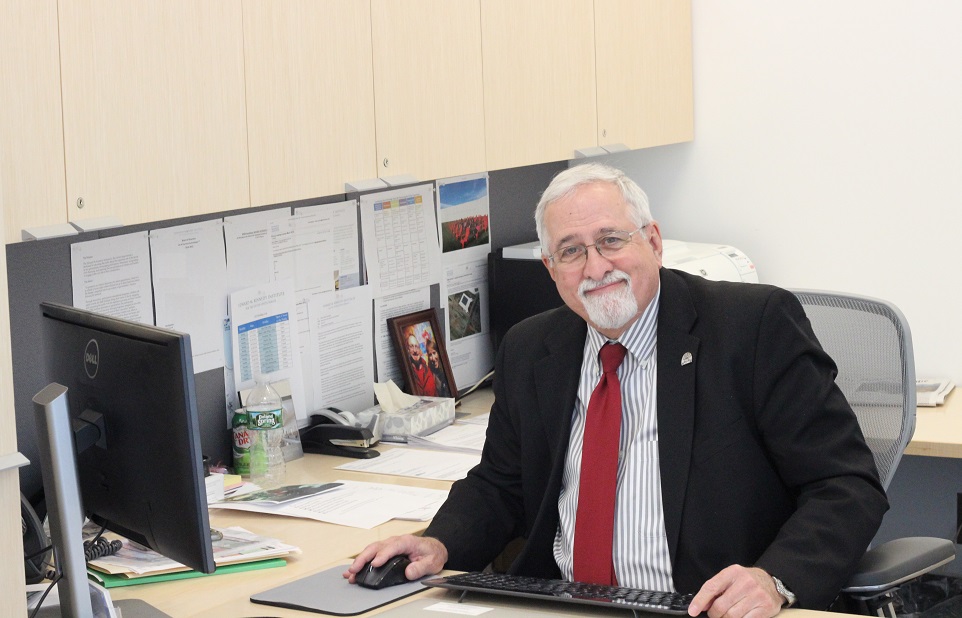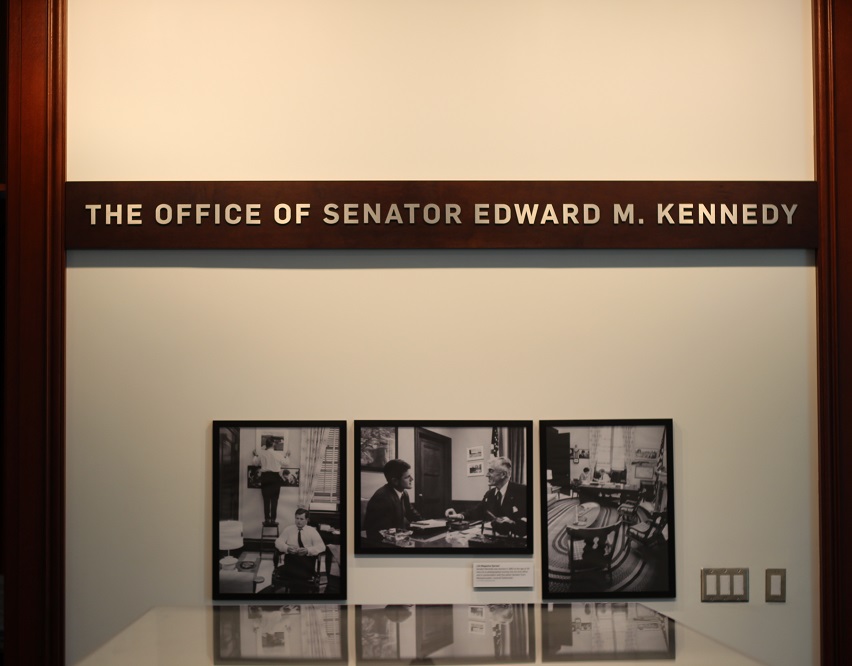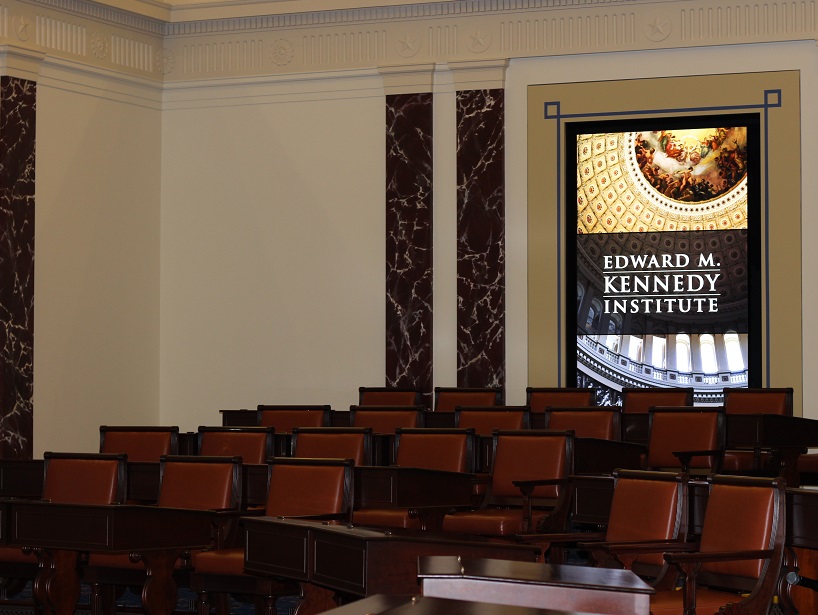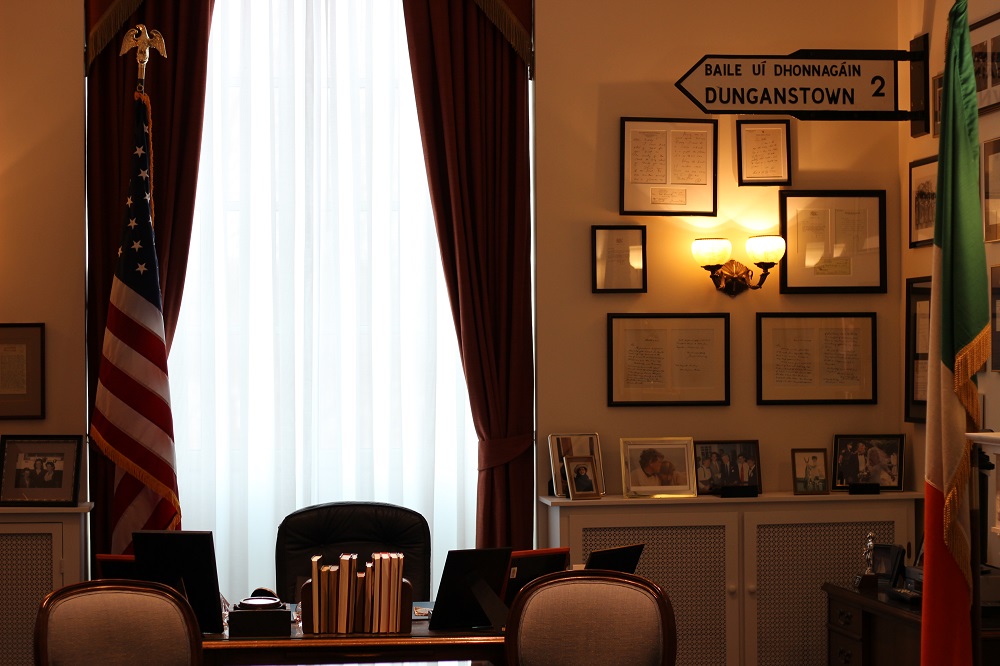New Horizons: Leading as an Interim Development Officer
An interview with Christopher Mosher, J.D. and Galen Hench
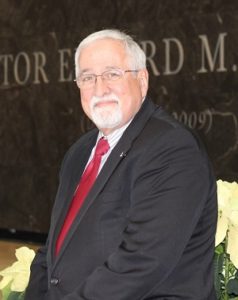 Editor’s Note: Christopher “Chris” Mosher currently serves as the interim Chief Development Officer at the Edward M. Kennedy Institute for the U.S. Senate in Boston, Massachusetts. This is Chris’ first interim assignment through The Registry. Prior to joining The Registry, Chris served as the VP for Advancement at Suffolk University, the VP for Development at Mount Ida College, the VP of Development at Embry-Riddle University and various roles at Northeastern University. He has also served as the development officer for a number of non-profit hospitals. Galen sat down with Chris to learn more about his very unique Registry interim assignment.
Editor’s Note: Christopher “Chris” Mosher currently serves as the interim Chief Development Officer at the Edward M. Kennedy Institute for the U.S. Senate in Boston, Massachusetts. This is Chris’ first interim assignment through The Registry. Prior to joining The Registry, Chris served as the VP for Advancement at Suffolk University, the VP for Development at Mount Ida College, the VP of Development at Embry-Riddle University and various roles at Northeastern University. He has also served as the development officer for a number of non-profit hospitals. Galen sat down with Chris to learn more about his very unique Registry interim assignment.
Hench: Would you please describe your role here, when you started, and when you think you will be finishing?
Mosher: My title is Chief Development Officer for the Edward M. Kennedy Institute for the U.S. Senate, and I’m responsible for a comprehensive fundraising program for the Institute. We run the typical components that you would find in any development shop: annual fund, major and principal gifts memberships, special events, and alumni relations.
In this office, we have five people and we also have a full time person in Washington D.C. So by Greater Boston standards, we’re a small shop—we’re a small Institute. We’ve been open for just two years, and so we’re still maturing.
I started on April 18th, 2017 on a six-month assignment. It has since been extended on a month-to-month basis. I came here originally because the Institute was in the middle of a presidential search, and they knew that it would be difficult to find a permanent chief development officer, so they approached The Registry.
Hench: Given how new the Institute is, has it been difficult to find donors? Who do you consider to be the “alumni” of this institute?
Mosher: There is an alumni cohort that is very unique to this institute. There are about eleven hundred people who worked for Senator Kennedy during his 47-year career in the U.S. Senate. We consider these people Kennedy alumni. It’s a unique and passionate group.
One of my concerns coming in to the Institute, having worked my entire career in the nonprofit sector—40 years in higher education as well as academic medicine—was that those institutions all had built in prospects. In the collegiate world, those institutions had proud alumni, which is an ever-growing constituency that grows faster than it declines. In health care it’s grateful patients. We don’t have either at the Institute.
We are a hybrid in a way; the Institute functions as an educational organization and a quasi-museum. People come here from grade school, high school and colleges. We also have visitors from the public at large who participate in simulated senatorial programs. Since we’ve only been open for two years, visitors make up only a portion our prospects. We have to go to nontraditional sources: friends of Ted Kennedy, corporations, foundations, colleges, and universities.
For example, we have an annual dinner, which is the single biggest fundraiser for the Institute. We raised over $859,000 this year from 322 guests. At our annual dinner, we had a number of colleges and universities contribute as sponsors. So, all in all, there have been some challenges here based on our newness.
But there is also opportunity. And the mission is so noble—we have a three-part mission: to emphasize the importance of the Senate in our democracy; to emphasize and encourage civil discourse; and to emphasize and encourage civic engagement. So when visitors leave we ask them to make a commitment that they will become engaged citizens in some fashion.
Hench: Is your experience at the Kennedy Institute more similar to your development work in nonprofit hospitals or in higher education? Or is the work you’re doing for the Institute an animal of its own?
Mosher: Obviously the skill sets are transferable from institution to institution, and experience has taught me that successful fundraising programs are mission driven and based on relationships. In higher education, you have a mission of educating the next generation of leaders, and in health care your mission is to save lives. Both are very, very noble. Here we have the mission of educating the public and encouraging civic engagement and civil discourse. And so the building blocks and the fundamentals are exactly the same.
What’s different is the speed. In higher education, the speed is glacier-like. It takes years to develop prospects, and the typical ways of doing it are through reunions and waiting for proud alumni to mature to a position where they have discretionary income and maturity about the importance of philanthropic giving.
In healthcare things are much faster. Patients are generally very grateful for the healthcare they received, and they are willing to immediately express that gratitude through philanthropic giving.
Here, it’s a combination of both. Our donors are both proud and grateful: proud to live in a democracy and grateful for the many years of service and good work done by Senator Kennedy.
Hench: What has been the most rewarding experience of your interim placement thus far?
Mosher: The most rewarding aspect of this job is, first and foremost, to be in an Institute that is unique and very different than anything else I’ve done. And although I’ve emphasized that the skill sets of fundraising and the fundamentals are exactly the same, it’s a different environment, which is very exciting to me.
Another rewarding opportunity is to work with a small, but dedicated team of folks that are passionate about what they’re doing. They know that they can make a difference, and it’s not just a cliché here—they are making a difference in the real world.
Of course, I’ve been satisfied with securing large gifts for our annual dinner. We were able to attract the Bank of America to support us at $100,000, which is substantial by any standard. And it’s also building new supporters here to become sustaining members of the Institute.
To be a sustaining member is a nominal contribution of forty-seven dollars. Why forty-seven dollars? Because that’s how many years Ted Kennedy served in the Senate. And we have a leadership society called the 1787 Society for $230 dollars. 1787 represents the year when the Senate was conceived and passed by legislation as a governing entity. Two hundred and thirty is the number of years since that happened. Next year it will be two hundred thirty-one dollars and the next year will be two hundred thirty-two dollars, etc. There’s logic and rationale to some of our entry points—to become a member of the Senate circle it’s a thousand dollars.
These are annual memberships, but they’re also annual gifts and as we all know in the fundraising field your best prospects are your current donors. And annual donors represent the pipeline to major gifts. We’re planning a capital campaign now for a new exhibit that we’re going to have that will focus on the Kennedy staff alumni.
Hench: How do you overcome the reality of being an interim development officer while simultaneously managing long term relationships, which you identified as being so critical to the success of fundraising?
Mosher: Well, as an interim you have the full prerogative of a permanent placement. And if you notice on my business card it says “Chief Development Officer”—it does not say interim. And that’s because relationships are important. Even though the assignment may be short—six months, twelve months—the work remains the same. It is important to work with those leaders that demonstrate the importance of the philanthropic agenda.
What does that mean? It means working very closely with the Board and emphasizing the importance of 100 percent participation from Board members. In order to be successful with donors and prospects that are outside of the Institute, the first questions you have to answer are “does your board support the Institute? Do your executive leaders support the Institute?” The answers have to be yes.
One of the expectations that I had was to introduce best practices to this Institute. And I did that by emphasizing first and foremost with the staff the imperative of teamwork. The staff became members of the Association of Fundraising Professionals, and embraced their Code of Ethical Standards as well as their Donor Bill of Rights, which are both published documents. And I made sure that our board of directors had them, as well as members of the team.
It’s interesting, Galen. We do emphasize in the profession the importance of relationship building. And yet, quite aside from an interim assignment, the average tenure now for a permanent chief development officer is three years or less. People move around. So it presents a real challenge about relationship building. Now, I was fortunate. If you looked at my CV, you saw that I worked at Northeastern University for twenty-five years. And I worked with a Senior Vice President who had been there for thirty years, and another vice president who’d been there for twenty or twenty-five years.
Those were different times—1970 through 1995. You’re not going to find that today. But at the same time, I also worked for a Board Chair who emphasized the importance of relationships and family. Now, who was that? George Matthews! Of course George is now the Chancellor & CEO of The Registry. You learn from the best.
Some of today’s challenges are the same—the ephemeral nature of relationships—but things are also different. We have social media now; when I started my career, there was no social media. As I advanced in my career I had the opportunity to introduce online donor recognition, online giving, and things like that. Here, social media is very big. We have a following on Facebook and Twitter. So staying current is really important. While things move more quickly relationships are built more quickly.
Hench: As a Registry interim, do you see yourself as more of a catalyst or as more of an analyst?
Mosher: I think it depends on the assignment. On this particular assignment, I am both an analyst and a catalyst—a change agent—emphasizing, as I said earlier, the best practices of teamwork, fundraising, and establishing quickly relationships with the executive leaders of the Institute, not only the President, but especially our co-founder Mrs. Victoria Reggie Kennedy.
When I got this assignment I got a call from George Matthews and he said, “congratulations, and by the way you’re going to meet people—very important people—that you’ve never met before in your previous jobs.” And he was absolutely right. I’ve met Tom Perez, the Director of the Democratic National Committee. I’ve met all of the Kennedys: Mrs. Kennedy, Joe Kennedy the third, Patrick Kennedy, Ted Kennedy, Caroline Kennedy. I’ve met Senators such as Elizabeth Warren and Ed Markey and other politicians. I’ve met Paul Kirk who stepped in when Ted Kennedy died. And you know he was an interim? He carried the title “Interim Senator.” He’s talked about the challenge of being an interim and getting things done.
It cuts both ways. You know, obviously my staff is concerned about working with a new president, but also they are going to be working with a new permanent Chief Development Officer at some point in time—whenever that is. Part of my job will be to smooth the transition and help restructure the development team as well as recruit a chief development officer.
Hench: What skills did you develop during your career that make you successful as an interim? I think you would agree with me that not everyone is suited for these types of roles?
Mosher: I’ve been in this field my entire career in the nonprofit sector. I started in public relations as a writer. And in that capacity, I was able to write about successful campaigns and fundraising enterprises at Northeastern. I did that at the director level for more than a decade.
Eventually I was recruited into the development side of the house, virtually without any fundraising experience. But what I did have were decades worth of relationship building and a deep understanding of institutional advancement. I’d been the spokesperson for the Institute for press relations and media relations. I published as Executive Editor of alumni magazine and a faculty staff newspaper. So I had a lot of the pieces of institutional advancement that you find in many organizations.
I went into development as the Executive Director of the Office of the Century Fund , which at the time was the largest and most ambitious campaign in that Institution’s history. I was then recruited away to a very unique niche institution in Florida–Embry Riddle Aeronautical University.
For me, it was like dying and going to heaven. I am a private pilot. So, the opportunity to work at an institution that Time magazine called “the Harvard of the Sky” was a unique experience. It was also my first vice president level position. Ultimately I returned to Boston to work in in academic medicine at Brigham and Women’s Hospital, a top-ten teaching hospital affiliated with Harvard Medical School.
In addition, I’m a lawyer. So these skill sets all fit in a variety of different ways. When you take all those experiences and academic achievements, they all fit. And I’ve been able to navigate organizations successfully: large institutions, small institutions, mature ones and developing ones.
Hench: As an interim, what does your week one game plan look like in order to develop buy in from your staff?
Mosher: What I did here and what I have done in other places is two things: First, I ask every staff member to fill out a short questionnaire that I call “getting to know you.” Tell me what you do; tell me what your top three priorities are; tell me how I can help you succeed in achieving those priorities; tell me something about yourself that most people don’t know. And virtually everybody does that—it’s a non-threatening exercise.
In my very first one-on-one meeting I articulate that in the advancement profession we’re asked to be cheerleaders for the organization. And you know what it’s like to be a cheerleader. You remember from your high school and college games the YMCA cheer, right? We have to approach it as a team.
And so I ask them how they would spell the word “teamwork”. So, for example, I ask for an attribute that begins with the letter “T”. And typically people will say things like “trust” or “truth” or “togetherness”. And then I ask them to give me an “E”. And they might say “excellence” or “envisioning”. And so in that way we spell the word teamwork.
In the first team meeting I actually put their responses on the white board. I make a digital version of it, and I give it to everybody for their bulletin boards. On first pass, it may sound a little goofy or a little bit sophomoric. But you know what—it establishes right from day one the importance of being part of this team.
Hench: On a lighter note, I read on your CV that one of your hobbies is motorcycling. Could you expand on that a little for us ?
Mosher: Oh! Born out of necessity. When I was in college I commuted to Northeastern for two years on a motorcycle because I couldn’t afford a car. For me it was freedom, because in my freshman and sophomore year I had to commute by public transportation. It was a multi-step thing: a train ride from Melrose to North Station and then the Greenline subway to Northeastern. The commute was brutal.
It was a Yamaha Riverside 50CC; it was a small bike and I rode it year round. After my kids graduated college I still had the motorcycle itch, and so I bought a Honda Shadow 600. I taught my son how to ride it. I gave him motorcycle riding lessons and then I bought myself a Kawasaki Vulcan 900, so now I have two motorcycles. When my son visits in the summer we have father-son rides.
One of the things I do is every Christmas Eve—weather permitting—I put on my Santa suit and I ride around town. If you ever want to be loved, then you want to be Santa on a motorcycle on Christmas Eve. I told the staff here that I did that—they all laughed.
Hench: Would you say that this Registry interim assignment has been a positive addition to your retirement?
Mosher: Very positive. I mean, this assignment is unique. When the opportunity at the EMK Institute came around I jumped at it. And it was a little bit unusual, because Bryan Carlson contacted me without revealing the client. It was a question of “would you be receptive to an unnamed client in Boston on an extremely confidential basis?” I said sure. Well the next thing I knew I was one of the three candidates that were being brought forward in a very unique way.
I would emphasize that being flexible and being receptive to the opportunity to make a difference is important. And even though it’s an interim assignment, you do have the full power and prerogative of a permanent position. You can hire and fire people and you can manage your budget. In my arena, which is advancement, I can make a tangible difference because I am raising money. And money can get things done.
So yes, I think this is one of the best things that a professional can do as they reach pre-retirement or retirement. And if you’re willing to take on different assignments, and you’re willing to adapt as I think most of us are, then I would rate this experience a 12 on a 10 point scale.
Editor’s Note: To see photos of the Kennedy Institute for the U.S. Senate and Chris in his Santa suit you can scroll through the images below.
HIRE AN INTERIM
Searching for an Interim?
Please contact us for more information.

